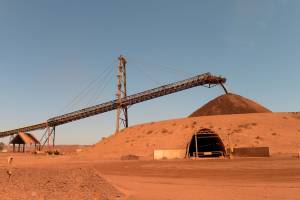Publicidade
Os preços do petróleo fecharam em queda hoje, em meio a expectativa de que o ataque do Irã contra Israel, no final de semana, não se transforme em um conflito mais amplo no Oriente Médio. As perdas, no entanto, arrefeceram à tarde, depois que Israel sinalizou que pretende promover uma resposta pela ofensiva
O WTI para maio fechou em queda de 0,29% (US$ 0,25), a US$ 85,41 o barril, na New York Mercantile Exchange (Nymex), e o Brent para junho recuou 0,39% (US$ 0,35), a US$ 90,10 o barril, na Intercontinental Exchange.
O Rittersbuch escreve que os preços caem em um cenário de “compre o boato e venda o fato”, mas pontua que a volatilidade permanece no Oriente Médio. O Banco ANZ concorda com a visão, e acredita que o petróleo não deve subir no curto prazo, dada a ampla capacidade disponível e um prêmio de risco geopolítico já elevado.
Continua depois da publicidade
“O ataque foi bem telegrafado e parecia planejado para infligir danos mínimos”, afirma o banco australiano, ao pontuar que Teerã já sinalizou que este é o fim de sua investida contra Israel. Agora, o possível fim do conflito está nas mãos israelenses.
“Só num caso extremo vemos que isso terá um impacto realista nos mercados petrolíferos”, conclui.
O Berenberg alerta, porém, que embora os impactos no curto prazo sejam limitados e uma escalada pareça improvável, caso as tensões aumentem e impactem o escoamento de petróleo no Estreito de Ormuz, os preços podem subir fortemente.
Mais para o fim do dia, circularam notícias de que Israel cogita formas de devolver o ataque sem perder suas alianças internacionais. As instruções, segundo fontes, são para que não haja vítimas civis. Os possíveis alvos incluem um possível ataque a uma instalação em Teerã ou um ataque cibernético, segundo um funcionário, que falou sob condição de anonimato ao The Washington Post.
Continua depois da publicidade
Também repercutiu a informação de que o chefe das Forças Armadas de Israel, Herzi Halevi, afirmou que haverá uma resposta ao Irã. Com a repercussão, os preços do petróleo reduziram parte das perdas, e enquanto isso, líderes mundiais pressionam Israel para que não haja uma retaliação contra o Irã.



